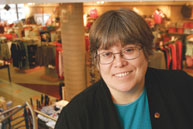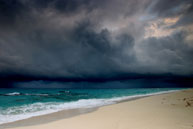In focus
Kimberley Stephenson: Book buyer by day, evil genius by night
Kimberley Stephenson, the smiling and friendly Trade and Reference Books buyer for the McGill Bookstore leads a double life. On the one hand, she is a dedicated bibliophile, working hard to make sure the bookstore carries a wide variety of scholarly and popular tomes for the McGill community. On the other, she is a polarizing figure who claims to be a secret agent in the employ of Concordia University to sow rivalries among different departments of McGill.

Kimberley Stephenson spends all year devising brain-busters designed to melt grey matter.
Owen Egan
It's all for a good cause though - Stephenson is the evil genius behind the Annual Centraide Trivia Night, whose devilishly difficult questions stymie some of the best minds McGill has to offer. The Trivia Night has grown from a small affair that drew 17 people to Gert's in 2001 into a nearly 100- person fact-filled fiesta with ongoing rivalries and side-bets that raised over $500 for McGill's Centraide Campaign this year, held in a banquet hall donated by the New Residence Hall. Teams, sporting names such as the Library Leaders and DAR-Vaders, are drawn from a variety of McGill departments, students and even some external "ringers."
Pretty good, considering that Stephenson had not initially intended to join the Centraide Committee at McGill in the first place. She had gone to her first meeting to keep a friend company, and soon found herself a part of the team that helped raise $292,000 for the Montreal charity last year. Soon, she was asked to run her own event and the trivia night was born.
"I'm always a little surprised people show up," said Stephenson modestly.
Polymaths get quite the treat at Stephenson's event. She comes up with each of the 60 questions - no off-the-shelf board game cards for her. They're tough too - the winning team this year (the Hassassins, a student team) had a score of only 38 out of 60. Winning teams get to choose from a selection of prizes donated by Stephenson's contacts in the publishing world: titles include such trivia friendly fare as Why Do Men Have Nipples? and Hundreds of Questions You'd Only Ask Your Doctor After Your Third Martini.
"I'm hoping the trivia fanatics can enjoy themselves. This year at the beginning I announced that I had dumbed down the questions and I could hear people in the crowd yelling 'No!'"
Trivia night participants will note that in addition to her command of a breadth of obscure subjects, Stephenson's questions reveal a keen understanding of human psychology. Take, for instance the question that asked which U.S. state the filmmaking Coen brothers described as "Siberia with family restaurants." Your average smarty-pants will automatically think North Dakota, the locale of Fargo. Not so: the brothers were actually describing their home state of Minnesota. Six teams managed to get that one in the last competition, which is about right in Stephenson's estimation.
"If no one gets it, it sucks, and if too many people get it, it sucks," she said.
That said, Stephenson and her volunteer "Judge Judys" will entertain alternative answers if they are well argued (one large and enthusiastic competitor this year received a point for getting the name of Dora the Explorer's pet monkey, although he only knew the French version).
Her questions - and this reporter has been sworn to secrecy as to how she comes up with them - tend to reflect her own biases.
"I can't stand golf or number questions, but I do like books and movies. I'll throw in a couple of sports and geography questions out of pity," she said.
To learn more about the McGill Centraide Campaign, please see www.mcgill.ca/centraide for upcoming events and ways to give. For information on the next fun event the Centraide committee has dreamed up - the Silent Auction - turn to page 12.
Answering the call
Hurricane Wilma turns vacationing med student into Doc Holiday
On Friday, October 21, Evan Blauer, a fourth-year medical student at McGill, found himself crammed into a makeshift shelter in Mexico with more than 60 other people. Hurricane Wilma, the most powerful ever recorded in the Atlantic Basin, had slammed into the coast hours earlier and was carving a path of destruction inland. The 280-km winds shrieked, windows shook, plywood creaked and people sat, knees to chest, dripping sweat, too hot and frightened to sleep. It was hard to believe that, less than 48 hours before, Blauer was enjoying a jungle kayak excursion as part of his all-inclusive vacation in Cancun. And the situation was about to get worse.

Hurricane Wilma reached speeds of 280 km/h, the most intense tropical cyclone ever recorded in the Atlantic basin. It caused the most destruction in Mexico's Yucatán peninsula, Cuba, and Florida. At least 47 deaths have been reported and the costs of the total damage will likely be around $20 billion.
iStock photo
In the middle of the night, a woman began having trouble breathing. Thinking she was hyperventilating, one good, but misguided, Samaritan gave the woman a bag to breathe into. Immediately, her condition got worse.
Blauer's training kicked in. He recognized that the woman wasn't hyperventilating at all; she was having a severe asthma attack. The last thing her oxygen-starved lungs needed was the infusion of carbon monoxide she was getting from the bag. "It actually could have killed her," he says.
Talking with the woman's husband, Blauer learned that she had no history of asthma so she didn't have any medication. Asking around, he located a Ventolin inhaler and administered the medication. He then moved the couple to an empty washroom that was much cooler. The crisis passed and within 45 minutes the woman, a tourist from Leeds, England, was able to talk. Thanks largely to Blauer's quick action the grateful woman would be fine.
But his work wasn't done. A rudimentary infirmary was set up where Blauer worked side-by-side with a pair of vacationing paramedics and two nurses from Memphis. Mostly, they bandaged people cut from broken glass and administered IVs to those suffering from dehydration. One woman was knocked unconscious when she slipped and cracked the base of her skull on the corner of a stair. The team immobilized her and put her in an ambulance that took her to a nearby hospital.
At McGill, where he's currently finishing his clinical rotation, Blauer is used to seeing patients by himself, but the difference in Mexico was that there were no residents to check with. He was on his own. "I got tested," he says. "It was stressful, for sure, but I was confident I could do the job."
For Blauer, getting back home was as much an adventure as living through the category 5 hurricane. In less than 12 hours, he took a winding taxi ride through devastated shanty towns; tried to salvage personal items from the blown out resort where, it was rumored, an alligator was lurking in the lobby; and had a harrowing bus ride to the airport through water that rose to the windshield.
Safe at home in Montreal, Blauer doesn't think twice when asked what he will remember most about his experience. "The local people were amazing," he says. "They could have gouged us when we bought food or took a cab, but they didn't. Everyone really pulled together." He was so impressed that he would return in a second. "I can't wait to go back," he says. "I feel like I owe it to the people."

